
The Middle East and North Africa (MENA), also referred to as West Asia and North Africa (WANA), is a geographic region. While still referring to most of the Middle East and North Africa together, it is widely considered to be a more defined and apolitical alternative to the grouping of countries that is known as the Greater Middle East, which comprises the bulk of the Muslim world.

The Arab Parliament is the legislative body of the Arab League. At the 19th Arab League Summit in Amman, the Arab states agreed to create an Arab Parliament, and came up with a resolution to give Amr Moussa the Secretary General of the Arab League the power to start and create the Parliament. In 2004, in the ordinary Arab League Summit in Algiers was the official date where all Arab League Members agreed to send their representative to the temporary Parliament sessions that took place in the headquarters of the Arab League in Cairo, Egypt, with each member state sending four members, until the Parliament is reassigned permanently to its under-construction office in Damascus.

This is a list of the competitive matches played by the Syrian football team since its inception.
This article includes the Bahrain national football team results since its beginnings.
This article provides details of international football games played by the Qatar national football team from 2000 to 2019.

The Association of Arab Universities, also called the Union of Arab Universities, is an organization working within the framework of the Arab League. It is based in Amman, Jordan. The objective of the organization is to support and connect universities in the Arab world, and to enhance cooperation among them.

The Arab Regional Centre for World Heritage is a Category 2 Centre under the auspices of UNESCO. founded as an autonomous and independent Bahraini public institution in 2010.

This is a list of the Iraq national football team results from 1980 to 1989.

This is a list of the Saudi Arabia national football team results from 1957 to 1979.

This is a list of the Iraq national football team results from 2010 to 2019.
















